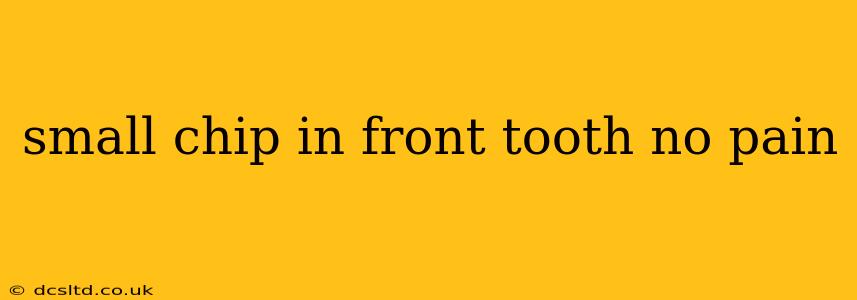A small chip in your front tooth, especially without pain, might seem insignificant. However, it's crucial to understand that even minor dental damage warrants attention. Ignoring it could lead to further complications down the line. This comprehensive guide will address common concerns regarding small, painless chips in front teeth, helping you make informed decisions about treatment.
What Causes a Small Chip in a Front Tooth?
Several factors can contribute to a small chip in your front tooth, even without causing immediate pain. These include:
- Trauma: Accidental falls, sports injuries, or even biting into hard objects like ice or hard candy can cause small fractures or chips.
- Bruxism (Teeth Grinding): Grinding your teeth, often unconsciously during sleep, puts significant stress on your enamel, leading to chipping over time.
- Worn Enamel: Years of wear and tear can weaken the enamel, making your teeth more susceptible to chipping. This is especially true with teeth already exposed to acidic foods and drinks.
- Dental Procedures: In rare cases, a small piece of enamel might chip off during a dental procedure.
Is a Painless Chip Serious?
While the absence of pain might seem reassuring, it doesn't necessarily mean the chip is harmless. A small chip can still expose the dentin, the layer beneath the enamel, making your tooth vulnerable to:
- Increased Sensitivity: While you may not feel pain now, sensitivity to hot, cold, or sweet foods and drinks could develop later.
- Further Damage: The exposed dentin is more susceptible to further chipping, cracking, or decay.
- Aesthetic Concerns: Even a small chip can be noticeable, affecting your smile's appearance.
How to Treat a Small Chip in a Front Tooth?
The best course of action depends on the size and location of the chip, as well as your personal preferences. Options include:
- Observation: If the chip is very small and doesn't cause any sensitivity or aesthetic concerns, your dentist might recommend monitoring it. Regular check-ups are essential to ensure the chip doesn't worsen.
- Dental Bonding: This cosmetic procedure involves applying a tooth-colored resin to the chipped area, shaping and polishing it to seamlessly blend with your natural tooth. It's a relatively quick, minimally invasive, and affordable option.
- Veneers: For larger chips or significant aesthetic concerns, porcelain veneers might be a better solution. These thin shells are custom-made to cover the entire front surface of the tooth, improving both appearance and strength.
- Crown: In cases of significant damage, a dental crown might be necessary. A crown completely covers the tooth, providing strength and protection.
Does a Small Chip in a Front Tooth Need a Filling?
Not necessarily. Fillings are generally used to repair cavities or larger areas of tooth decay or damage. A small chip may not require a filling, especially if it's addressed with bonding or a veneer. Your dentist will assess the extent of the damage and recommend the most appropriate treatment.
How Long Does it Take to Repair a Chipped Front Tooth?
The repair time depends on the chosen treatment method. Dental bonding is typically completed in a single visit, while veneers require multiple appointments for preparation, impressions, and placement. Crowns also usually take multiple appointments.
How Much Does it Cost to Repair a Chipped Front Tooth?
The cost varies significantly depending on the treatment, the dentist's fees, and your location. Dental bonding is generally the most affordable option, while veneers and crowns are more expensive. It's best to consult with your dentist for a personalized cost estimate.
When Should I See a Dentist About a Chipped Tooth?
Even if your chipped tooth doesn't hurt, it's crucial to schedule an appointment with your dentist for an evaluation. Early intervention can prevent further damage and preserve the health of your tooth.
Disclaimer: This information is for general knowledge and does not constitute medical advice. Always consult with a qualified dentist for diagnosis and treatment of any dental condition.
